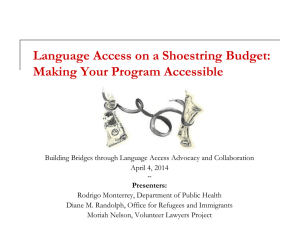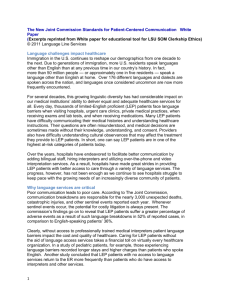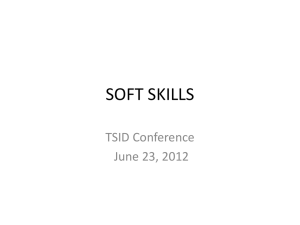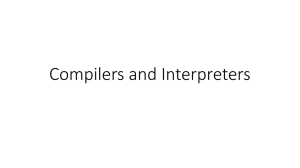June 2013 Interpreter Training sykvmn
advertisement
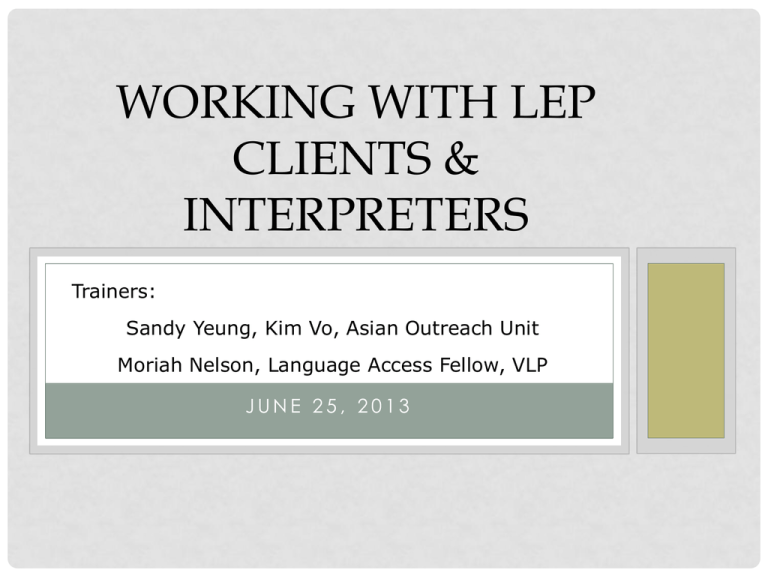
WORKING WITH LEP CLIENTS & INTERPRETERS Trainers: Sandy Yeung, Kim Vo, Asian Outreach Unit Moriah Nelson, Language Access Fellow, VLP JUNE 25, 2013 AGENDA • Introductions • Language Access Advocacy • Working with Interpreters • Hiring interpreters • Best Practices • Ethical considerations • Cultural Barriers GROUP INTRODUCTIONS • Name • Unit • Language(s) you speak • Have you had any experience working with/as an interpreter? LANGUAGE ACCESS ADVOCACY – NUMBERS oWhat are the top five languages spoken by LEP individuals in Suffolk County? 1. 2. 3. 4. 5. Spanish (49% of LEP population) Chinese (11%) French/Haitian Creole (7.5%) Portuguese (6.7%) Vietnamese (6.7%) LANGUAGE ACCESS ADVOCACY – NUMBERS oWhat are the top five languages spoken by LEP individuals in Norfolk County? 1. 2. 3. 4. 5. Chinese (32% of LEP population) Portuguese (10.3%) Spanish (7.8%) Vietnamese (7.8%) Russian (6.8%) LANGUAGE ACCESS ADVOCACY • Title VI of the Civil Rights Act of 1964 • Prohibits discrimination based on race, color, or national origin by recipients of federal funding • Lau v. Nichols, 414 U.S. 563 (1974) • Title VI prohibits national origin discrimination based on language; • Ensure LEP individuals have meaningful access to federally funded programs LANGUAGE ACCESS ADVOCACY • Executive Order 13166 • Prohibits recipients of federal assistance from discriminating based on national origin by failing to provide meaningful access to LEP individuals • DOJ LEP Guidance • Federally funded agencies have to issue plan to improve access by LEP persons • Four-factor analysis LANGUAGE ACCESS ADVOCACY • Massachusetts Gen. Laws c.151B • Executive Order 478 • MA Language Access Policy Implementation Guidelines • Language Access Coalition • Legal Services Programs • Courts • State Agencies LANGUAGE ACCESS ADVOCACY AT GBLS • Individual case level • Using Language Access as legal handle • Systemic advocacy: • Bilingual Ballots Advocacy • Boston Housing Authority • Department of Unemployment Assistance • Department of Transitional Assistance • Department of Industrial Accidents OTHER RESOURCES • lep.gov • Massachusetts Language Access State Agency Policy Implementation Guidelines www.mass.gov/Eoaf/docs/anf/anf16_lang uage.doc • Massachusetts Legal Services: Language Access Library http://www.masslegalservices.org/librarydirectory/language-access TRANSITION: WORKING W/ LEP AND THE NEED FOR AN INTERPRETER? • When do clients need an interpreter? • When do advocates need an interpreter? DEFINITIONS & TERMINOLOGY • Interpreters – interpret spoken word • Translators – translate written text • Modes of Interpretation • Simultaneous • Consecutive • Sight Translation INTERPRETER ROLE WORKING WITH INTERPRETERS BEST PRACTICES 1. Arrange for a qualified interpreter. 2. Schedule additional time for meeting when interpreter is needed. 3. Prep & Instruct the interpreter. 4. Discuss confidentiality. 5. Arrange seating with direct eye contact with the client. 6. Speak directly to the client using first person. WORKING WITH INTERPRETERS BEST PRACTICES 7. Use plain English. Define legal terms. No legalese. 8. Pause regularly. Remind client to pause. 9. Confirm mutual understanding; ask clarifying questions and confirm key facts or decisions. 10. Maintain 3-way communication. 11. Explain purpose of questions. 12. Give client your contact info. 13. Debrief with the Interpreter. DEBRIEF WITH THE INTERPRETER Some questions you can ask, include: • From your perspective as the interpreter, how did this meeting go? • Were there any moments where you felt you had to go beyond your role in order to faithfully interpret what was said? • Were there instances during the interpretation in which you added or subtracted from the interpretation, and if so can you share the reasons for this? • What suggestions do you have for how I can be more sensitive or more responsive to the client’s culture, when for example, I ask questions, give information or make suggestions? GBLS GENERAL POLICY FOR ARRANGING INTERPRETERS SERVICES Casehandler is responsible! Situations: a) Conference calls/telephone to set up appointment/ walk-ins – use Optimal Phone Interpreters (OPI) b) In personal meeting or phone interview – arrange for interpreter c) Emergency (not walk-in) – use OPI, find bilingual staff TIPS FOR USING TELEPHONE INTERPRETERS 1. Get the interpreter’s name or ID number 2. Context and Introductions 3. Test the client’s understanding indirectly 4. Remember that the interpreter cannot see you 5. Ask the LEP client if the interpretation was successful RULES OF PROFESSIONAL CONDUCT FOR INTERPRETERS • Canon 1: Accuracy & Completeness • No omissions, additions or summary • Style, tone and register • Canon 2: Representation of Qualifications • Canon 3: Impartiality and Avoidance of Conflict of Interest • Real or perceived • Canon 4: Professional Demeanor • Unobtrusive • Canon 5: Confidentiality • Attorney-Client Privilege RULES OF PROFESSIONAL CONDUCT FOR INTERPRETERS • Canon 6: Restriction of Public Comment • Canon 7: Scope of Practice • Only to serve as an interpreter or translator • No legal advice or personal opinions/beliefs • Canon 8: Assessing and Reporting Impediments to Performance • Canon 9: Duty to Report Ethical Violations • Canon 10: Professional Development Source: National Center for State Courts Model Code of Professional Responsibility for Interpreters in the Judiciary WHEN YOU ARE INTERPRETING… • Know that your language skills are valuable! • Know what your role is • Know the vocabulary - (MLS legal glossaries) • Know that you need to practice • Know your limits! Know when to say no! • Interagency Language Roundtable (ILR) Language Proficiency Self-Assessment CULTURAL BARRIERS • Excerpt from Susan, Bryant, The Five Habits: Building Cross-Cultural Competence in Lawyers, 8 CLINICAL L. REV. 33 (2001). • Culture is like the air we breathe -- it is largely invisible and yet we are dependent on it for our very being. Culture is the logic by which we give order to the world. • Through our invisible cultural lens, we judge people to be truthful, rude, intelligent or superstitious based on the attributions we make about the meaning of their behavior. CULTURAL BARRIERS • Ask: what assumptions am I making? What bias am I bringing? • Listen to the Client. • What cultural understanding of issues does the Client bring? DIFFERING UNDERSTANDINGS OF SYSTEMS AND BUREAUCRATIC PROCESSES • Clients May Have Differing Concepts of • Process • Roles • Ownership/ Entitlement • Decision making • Terms of art in Legal world ROLE PLAY EXERCISE • Instructions: • Focus on role of advocate • Identify problems advocate is having with the interpreter and client • Refer to best practices handout and identify solutions to resolve these problems GBLS RESOURCES • • • Interpreters List: S:\Public\_GBLS Interpreters List Invoice for Service Internal website Evaluations: Internal website CLOSING DISCUSSION • Talk to your Supervisor to check on your unit policies regarding LEP clients • Do evaluations on interpreters • Check materials on our Shared Drive: s:\Public\Working with LEP clients and Interpreters

